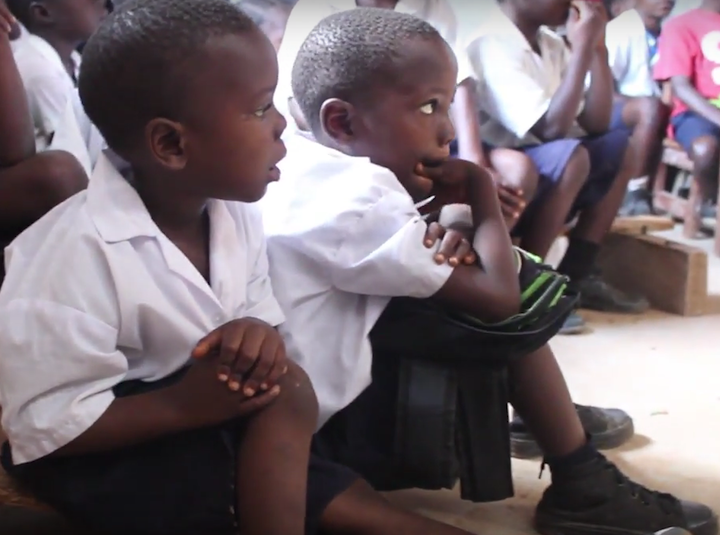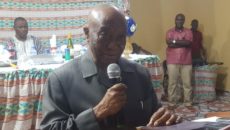Accepting Liberty Party’s nomination to contest this year’s presidential elections, Charles W. Brumskine made some pledges regarding education that appear quite laudable at first glance. However, further scrutiny reveals that Liberty Party’s education policies are nothing new.
In his acceptance speech as the standard-bearer at the party’s recent convention in Nimba, Brumskine listed a 15-count commitment for short-term accomplishments if elected to the presidency in October. He said his government would underwrite all West African Examinations Council fees and make all government schools free of charge.
He said his administration would also establish a Student Service Corps to draw high school graduates and college students into community service. Those students work for the government during their annual vacations.
“The government will, in turn, pay for their college education,†Brumskine said.
The Liberty Party’s presidential hopeful also promised to expand the education sector with more formal and informal teaching and training opportunities. This, according to him, will target school-aged children, adult learners, and include vocational and technical education.
“We will computerize the schools, and use the internet as a tool for learning,†he added. “We will not recreate the old Liberian education system—with its bias towards liberal arts training leading up to the college level; we will make education more relevant to existing and the future jobs and skills needs of the economy.â€
At the same time, he promised that his administration would extend the school day to late afternoon, initially on a voluntary basis, to give children the opportunity to learn more, and to have the benefit of adult supervision while their parents are at work.
Brumskine’s speech was a slight development of Liberty Party’s more comprehensive policy statement on education, published in 2015.
In that policy, the party said it seeks to produce students with the ability to think and write independently and technologically savvy and globally engaged graduates. It would achieve these results by investing in curriculum development and transformation, and educational infrastructure.
Liberty Party’s statement said it would review and revise all fees and hidden costs in school tuition, provide additional classrooms spaces, revise grade repetition policy, make staying in and completing primary and secondary schools more attractive, provide sensitization on the importance of girls acquiring secondary education, and make secondary schooling more attractive for girls.
However, when compared to the current policy espoused by the Ellen Johnson Sirleaf administration, Brumskine and Liberty Party’s policies do not seem much different.
Since coming to power in 2006, the president has undertaken several measures including introducing new policies aimed at improving the educational sector.
Among them is the reinforcement of the compulsory and free primary education in public schools.
In her last State of the Nation address in January, Sirleaf promised that amendments would be proposed to the Education Reform Act of 2011, aimed at removing all fees and charges, official or otherwise, from early childhood education in public schools. These, she said, were consistent with her administration’s commitment to free education.
She also announced an extension of the free education policy to the 12th grade, from being only at the primary level.
“We hereby extend, to 12th grade, free education in public schools, commencing FY2017/18 budget,†she said.
She said penalties would be imposed on institutions and their heads that continue to extract money from parents and students.
“There is no doubt that education is a prime enabler of success, and that this has to be a high priority in government,†she noted.
Being aware that education is a long-term endeavor, she added that more rapid results can only be achieved by departing from traditional structures.
This led to the introduction of the Partnership Schools for Liberia initiative, with direct support from private partners, domestic and international; which aims at a rapid educational transformation.
The government’s Education Sector Plan, which is supported by its international partners, also includes provisions of achieving free primary and secondary education by 2030.
Meanwhile, Vice President Joseph Boakai, who will replace Sirleaf as head of Unity Party, has said nothing new on how he intends to improve on the sector.
The political leader of the Coalition for Democratic Change, George Weah, is also proposing free education for all.
Responding to a petition from supporters to contest for the presidency in October prior to forming the coalition with the National Patriotic Party and National Democratic Party of Liberia, Weah said as president he would declare substandard education in the country as a national security threat.
He promised to direct more budgetary allocations to improve the quality of education by investing in teachers’ training and benefits.
After being sworn in as head of the coalition, the CDC presidential hopeful also maintained that his government’s strategies would be built on six agenda items, including free education for all.
For his part, the Alternative National Congress’ political leader, Alexander Cummings, is considering increased training teachers as a key priority.
Speaking at a dedicatory program on the campus of St. Clement University last year, Cummings stressed the need to train more qualified teachers to teach in classrooms.
The All Liberian Party of businessman Benoni Urey says investing in quality education –vocational, primary, secondary, and postsecondary – will help turn the country’s natural and mineral resources into sustainable development.
The ALP says education helps lift people out of poverty and creates vast new opportunities to reduce unfair income distribution and increase choices.
“It creates awareness and helps to sustain democracy and peace. ALP considers education as a right, not a privilege,†it says.
Meanwhile, the party has promised to raise the morale and productivity of teachers, by launching an initiative for teachers which will ensure that matters relating to teachers are treated with utmost importance.
Key under its platform, ALP promises to review and make functional the National Teachers Association to create opportunities for teachers to have a career path and developing an ad hoc incentive scheme for science teachers and those in remote areas.
It says the party intends to promote technical and vocational education, encourage public-private partnership, and establish adult and functional literacy programs in all chiefdoms and urban towns, increase access and affordability to pre-primary, primary, and secondary education. Additionally, ALP wants to reintroduce a school bus system in urban areas to enable children to get to school on time.
For the former Central Bank of Liberia’s governor, Mills Jones, policies and practices aimed at providing the necessary human resource to develop the economy and run institution with efficiency will be necessary.
Speaking last year when he accepted a petition to contest for the presidency, the Movement for Economic Empowerment leader said more investment will be made in technical and vocational education under his administration.
He criticized the government’s recent public-private partnership in the educational sector and promised to encourage local community participation as a means of cleaning up the “mess†in the sector.
He also promised to institute student loan programs to empower more young people to get an education.
Overall, a review of the presidential candidates’ proposals regarding education shows that proposing free education or other measures to improve education is not unusual. The thorny issue, however, has been figuring out how to pay for it.
Even the Sirleaf administration’s free primary education policy has gone unenforced and is largely ineffective because the government has not provided enough funding to schools.
Efforts like the Education Reform Act’s provision that signature fees should go into the education budget have been unsuccessful at drawing any additional funds to the education sector. Amid the measure, the sector is still underfunded, with a good amount of support still coming from development partners.
So how much funding does the Ministry of Education really need to ensure that schools are at a minimal level of quality?
There are 800,000 students in public and community schools, according to the Ministry of Education’s statistics report for 2015/2016. If the Partnership Schools for Liberia’s estimate that the country needs to spend US$100 per primary school student per year is considered a good starting point, then the education budget would need to be increased from the current US$47.6 million provided in the draft 2017/2018 budget for both the Ministry of Education and the Monrovia Consolidated School System to US$80 million.
This number is likely to go up because this is an estimate that uses primary school numbers to extrapolate to high schoolers and early childhood education, which no doubt cost more. Some education insiders have even estimated that the Ministry of Education might need as much as US$100 million.
The US$80 million figure, however, would be 15.2 percent of the 2017/2018 draft budget. That would make the entire education sector take 21.7 percent of the budget, including funding for tertiary institutions.
Convincing the legislature and the nation that Liberia needs to spend US$114 million on education each year will take a serious conversation and an adjustment of priorities, even as there are talks of reducing the currently proposed draft budget. Moreover, in the aftermath of Ebola, it would be tough to justify giving education a significantly greater portion of the budget than the health sector.
So far, only one opposition politician has proposed a solution to the issue of funding education that would not take money from existing programs.
Before joining George Weah under the banner of the Coalition for Democratic Change, the former ambassador to the U.S., Nathaniel Barnes, harbored dreams of being president. One of a series of documents that he referred to as the pillars of the Covenant with Liberia proposed creating an education trust.
He estimated that Liberia’s Education Ministry needed US$80 million each year (not far off from using the Partnership Schools for Liberia estimate) and proposed raising taxes on the US$11.6 million worth of tobacco products and the US$60.5 million worth of alcoholic beverages being sold in the country.
“Currently, Liberia imposes a 25 percent excise tax on imported alcoholic beverages and tobacco products,†Barnes wrote in an op-ed. “If that excise tax is increased to 50 percent of the total taxable value, we will automatically generate a minimum of US$25.6 million from imports alone, with an additional US$13 million generated by placing a 20 percent tax on domestic production.â€
He suggests that other behaviors and goods that are considered vices, like gambling, could also be taxed at higher rates.
“Every dollar from this tax would be placed into the fund,†he added.
According to him, the current Education Sector Plan is a workable tool to improve learning for students.
“The real question is, how do we finance that plan fully, sustainably, and consistently for as long as is required to create an environment where our children and youth can learn, experiment, innovate and thrive in similar forms and manners as other young people around the world,†he said.
Unfortunately, it is not clear how big of a role Barnes will play in the upcoming election and whether he will be able to push his ideas across, as he has announced his resignation from CDC last month.
While Brumskine must be commended for his party’s generally more issues-based focus, he could learn more from Barnes’ better thought out policy.
If the Liberian government cannot find the funding needed for education, it will not be able to achieve any of its policy goals of making education free for all. Anyone shooting to sit at the helm of government needs to know this and have an effective strategy at hand.
Featured photo courtesy of Lloyd Massah






